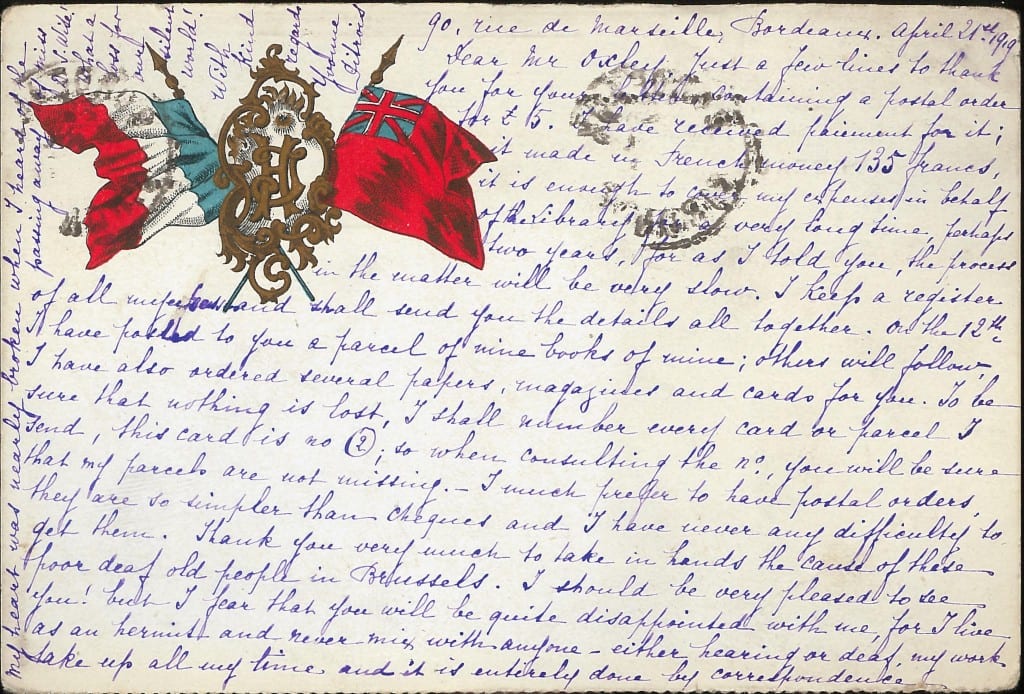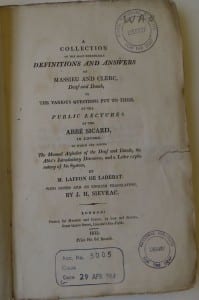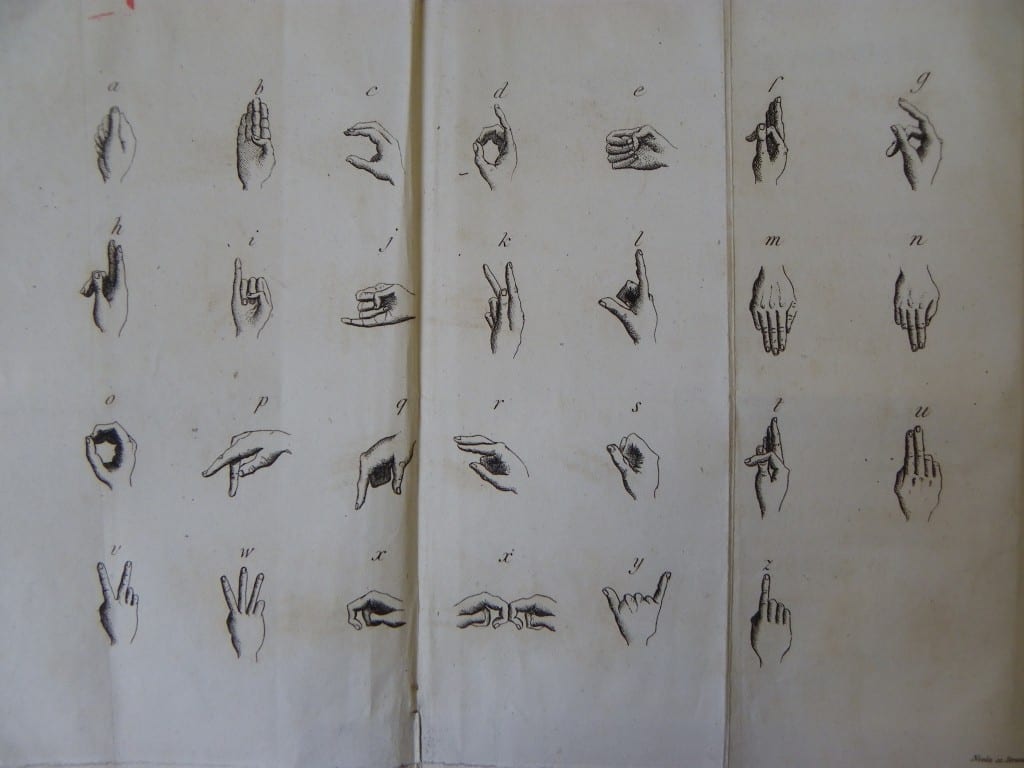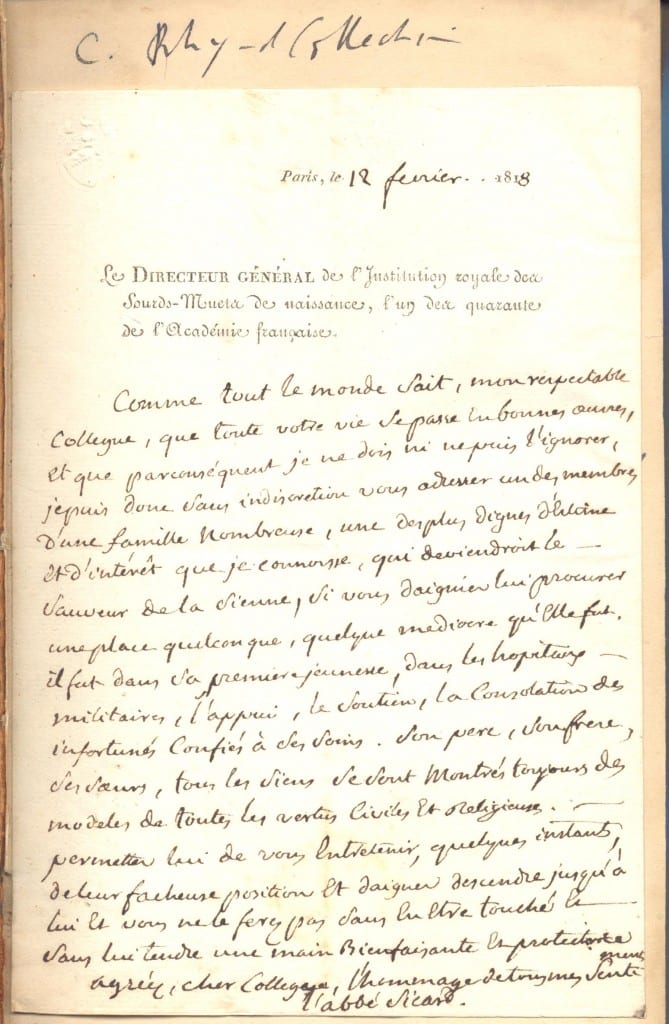A card from Yvonne Pitrois, Deaf Writer (1880-1937)
By H Dominic W Stiles, on 25 July 2014
Yvonne Pitrois was a deaf writer whose name became known in the Anglophone Deaf community in Britain, the USA and Australia through her articles in newspapers such as the British Deaf Times.
 Although she was born hearing, on 18th of November 1880, at the age of six she became deaf after suffering from sunstroke we are told (Roe), and her sight was also severely affected for many years.* She was however taught to read and write by her mother, who remained Yvonne’s companion until she died in 1927. Her works began to appear in periodicals when she was seventeen, and we are told by Roe that she became a member of the Société des Gens de Lettres. Roe says,
Although she was born hearing, on 18th of November 1880, at the age of six she became deaf after suffering from sunstroke we are told (Roe), and her sight was also severely affected for many years.* She was however taught to read and write by her mother, who remained Yvonne’s companion until she died in 1927. Her works began to appear in periodicals when she was seventeen, and we are told by Roe that she became a member of the Société des Gens de Lettres. Roe says,
She considers that the deaf of England and the United States are better off than those of France, for in the latter country there are very few who interest themselves in the spiritual and temporal welfare of the deaf as a class. This specially applies to the adult deaf, and she points to the fact that there is only one Protestant clergyman – M. Vigier, of Paris – a former teacher of the deaf, who is really doing satisfactory mission work among the Protestant deaf.
Her background was Huguenot.
During the Great war she worked hard for the Deaf of France and Belgium uprooted by the war, and was afterwards decorated by the King of Belgium (Hartig, p. 94). From 1913 to her death in 1937, she published and edited La Petite Silencieuse. We have a complete set in the library. The last edition was a ‘special issue’ after her death, with photographs and biographical notes. It says,
Son ardent patriotisme lui a inspiré des récits qui apportèrent aux heures sombres de 1914-18 un regain de courage aux soldats dans la tranchées, un peu de baume aux meurtrissures des pauvres mamans, des fiancées deuillées, des veuves solitaires! (La Petite Silencieuse, Noel 1937, p.7)
From the postcard below, we can see that in 1919 Pitrois began to act as an ‘agent’ for Selwyn Oxley, obtaining books and journals for his growing ‘Ephphatha’ Library, which was a forerunner of our collection.
After discussing what she will do in obtaining and sending him, material, she writes,
Thank you very much to take in hands the cause of these poor deaf old people in Brussels. I should be very pleased to see you! but I fear that you will be quite disappointed with me, for I live as an hermit and never mix with anyone – either hearing or deaf, my work take up all my time and it is entirely done by correspondence. My heart was nearly broken when I heard of the passing away of Miss D.S. Wise! ** What a loss for our silent world!
With Kind Regards
Yvonne Pitrois
Click for a larger size.
*Hartig says this happened when she was aged seven (p.78).
** Dorothy Stanton Wise, Deaf Sculptor (we hope to cover her in a future item).
Roe, W.R., Peeps into the Deaf World, London, 1917, p.347-8
Hartig, Rachel M., Crossing the divide : representations of deafness in biography, Washington, 2006
La Petite Silencieuse 1913-37
 Close
Close





